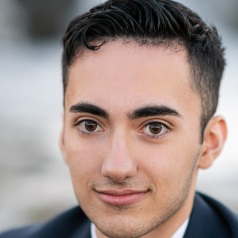I was just 14 years old when I immigrated alone from Iran to the United States. My parents couldn’t come with me. They stayed behind, sending me off with love, fear, and faith that I could somehow build a better life in a new world. I landed in Arizona, where I would live with extended family and try to figure out how to survive; succeed; and, someday, make them proud.

Aryan Abazari
I didn’t speak English. I didn’t know the culture. And I didn’t fully understand how much pressure I carried as a teenager trying to navigate life alone in a foreign country. While other high school students worried about prom or football games, I was focused on things like food stamps, free lunch forms, and saving coins for bus fare. My extended family helped where they could, but money was always tight. I learned quickly that there would be no safety net—only my own discipline and determination.
Through it all, one thing anchored me: my older brother. He remained in Iran with our parents, but he was my greatest support system, constantly encouraging me over calls and messages. He wanted to be a psychologist and always reminded me that helping others made our struggles meaningful. I wanted to become a physician—and together, we dreamed of a future where we could serve others side by side.
But life can be cruel. My brother struggled silently with depression for years. Despite his brilliance, kindness, and ambition, the weight of untreated mental illness eventually overwhelmed him. He died by suicide before he could begin graduate school.
His loss shattered my world.
But it also gave my purpose new urgency. I no longer wanted to be a doctor just to make my family proud. I wanted to become the kind of physician who could recognize invisible wounds, support struggling families, and advocate for mental health—especially among immigrants like us who are too often overlooked.
I also knew I had to be smart with money. As someone with no financial safety net, I understood early that debt could be as dangerous as disease. I watched people in my community drown in bills, defer dreams because of loans, and avoid necessary care due to cost. I promised myself I would never let financial ignorance take away my future.
So. I got to work.
While completing my undergraduate degree in biomedical science, I juggled jobs as a tutor, lab assistant, and classroom cleaner. Every dollar mattered. I learned how to budget using free apps. I devoured personal finance content on YouTube and podcasts—especially from The White Coat Investor. I started building credit the right way, opened a Roth IRA, and used high-yield savings accounts before most of my classmates knew what a deductible was.
When I entered a post-baccalaureate program to improve my medical school chances, I stuck to a strict financial plan. I lived in a modest room, meal-prepped every week, and bought a used 2008 Honda Civic in cash after saving for years. No luxuries. No credit card debt. Just relentless focus. While some peers went on vacations or upgraded their electronics, I invested in myself—slowly, steadily, and with purpose.
Now, as I apply to medical schools, I’m bringing that same mindset with me. I track application costs on a spreadsheet, apply for every aid opportunity available, and strategically target schools with reasonable tuition and strong support systems. The AAMC Fee Assistance Program helped me cover my MCAT and primary applications, which felt like a miracle. Without it, I don’t know how I could’ve afforded to apply.
I’ve been accepted to two medical schools so far. As I decide where to go, I’m not just thinking about prestige—I’m thinking about student loan interest rates, living costs, future repayment plans, and long-term stability. My plan is to live like a resident before I become one: minimal rent, no car loans, and a budget that prioritizes needs over wants. Medicine is my mission, but financial freedom is my foundation.
My brother’s death taught me that life is fragile, that mental health is everything, and that purpose can be born from pain. His dream to help others didn’t die with him—it lives on in me. And now, I want to help others heal emotionally, physically, and even financially. I want to be the kind of doctor who listens carefully, who understands what it means to live in survival mode, and who empowers patients with not just treatment but with hope.
I may not have parents here, or wealth, or a picture-perfect past. But I do have something just as powerful: vision, grit, and gratitude. Every time I study, every time I decline a luxury I can’t afford, every time I volunteer or mentor someone younger than me, I feel closer to the doctor I want to become.
To the future medical students reading this: your background doesn’t limit you. Your debt doesn’t define you. Start learning about money now. Use budgeting tools. Avoid unnecessary loans. Open a Roth IRA if you can. Build good credit early. Live frugally during school so you can practice medicine without being shackled by financial stress. You don’t need to be rich—you just need to be wise.
And to the judges reading this: thank you for creating space for stories like mine. This journey isn’t just about white coats. It’s about everything we carry with us when we earn them—our trauma, our resilience, our families, and our faith in a better future.